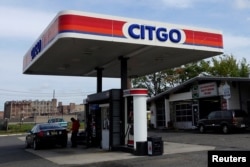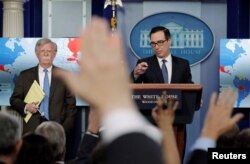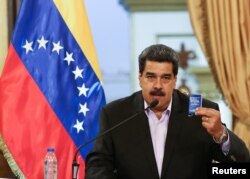U.S. National Security Adviser John Bolton warned Venezuela's attorney general that there may be "serious consequences" after the prosecutor asked the country's Supreme Court to keep opposition leader Juan Guaido from leaving the country.
"We denounce the illegitimate former Venezuelan Attorney General's threats against President Juan Guaido," Bolton wrote Tuesday on Twitter. He added the consequences will hit "those who attempt to subvert democracy and harm Guaido."
Attorney General Tarek William Saab also asked the court to block Guaido's financial accounts, as he launched a criminal investigation into Guaido's activities against President Nicolas Maduro's socialist government.
Saab said the probe is linked to unrest that came after Guaido declared himself the country's legitimate president last week.
In a CNN interview Tuesday, Guaido said it is possible to have a peaceful transition from Maduro and eventually hold free elections.
Guaido's remarks came after Washington imposed sanctions on PDVSA, Venezuela's government-owned oil company.
The Trump administration said the sanctions are intended to preserve the assets for the Venezuelan people. The U.S. has recognized Guaido as the country's interim leader and condemned the 2018 election, in which Maduro won another term, as a charade that was neither free nor fair.
U.S. Vice President Mike Pence is meeting at the White House on Tuesday with Carlos Alfredo Vecchio, appointed by Guaido to be Venezuela's representative in the United States.
'Stealing' Citgo
The sanctions announced Monday will freeze any assets the state-owned PDVSA has in the United States. U.S. firms and citizens are barred from doing business with it.
PDVSA's U.S.-based subsidiary, Citgo, which refines Venezuelan oil and sells Citgo brand gasoline in the U.S., will continue to operate as usual. But any money Citgo earns will be placed in a blocked account.
Maduro said the United States is trying to "steal" Citgo from Venezuela.
"I have given specific instructions to the head of PDVSA to launch political and legal action in U.S. and international courts to defend the property and assets of Citgo," he said on Venezuelan television.
The embattled president also demanded that his U.S. counterpart keep his "hands off" Venezuela, and warned that if violence breaks out in the country "the blood that could flow in Venezuela will be blood that will be on your hands."
Treasury Secretary Steven Mnuchin said Maduro and his allies have long used the state oil company as a vehicle for corruption and embezzlement. He said Venezuela is rich in oil and there is no reason for its people to suffer thorough economic disaster and severe food and fuel shortages.
PDVSA is the country's main source of income and cash from the United States. Venezuela's oil industry has long relied on the U.S.
Mnuchin said Venezuela can get relief from the sanctions when control of the oil company is turned over to Guaido.
Backing Guaido
In other developments, the U.S. State Department said Tuesday it has certified the authority of Guaido to control specific Venezuelan government assets held by any U.S.-insured bank. State Department spokesman Robert Palladino said the certification "will help Venezuela's legitimate government safeguard those assets for the benefit of the Venezuelan people."
Guaido declared himself president last week after his opposition-controlled National Assembly declared Maduro's presidency illegitimate.
Guaido called on Venezuelans to mount a peaceful, two-hour, midday protest Wednesday "to demand that the armed forces side with the people." He is offering amnesty to soldiers who back his movement and reject Maduro's socialist government.
Maduro insisted Sunday that the military is on his side as he watched military exercises using Russian-built rocket-propelled grenades and anti-aircraft machine guns.
The collapse of world energy prices, corruption and failed socialist policies have created an economic and humanitarian crisis in oil-rich Venezuela.
Food, fuel and medicine are in extremely short supply. Inflation is out of control. Millions of Venezuelans have fled the country, and Maduro has shown little tolerance for opposition-led protests.
Mounting tensions in Venezuela prompted the U.S. State Department to warn U.S. citizens Tuesday not to travel to the country. The agency issued the warning "due to crime, civil unrest, poor health infrastructure, and arbitrary arrest and detention of U.S. citizens."
Maduro has blamed his country's woes on the United States, which he accuses of working with the opposition to topple the government.
He has called world leaders who want him gone "Trump sycophants."








